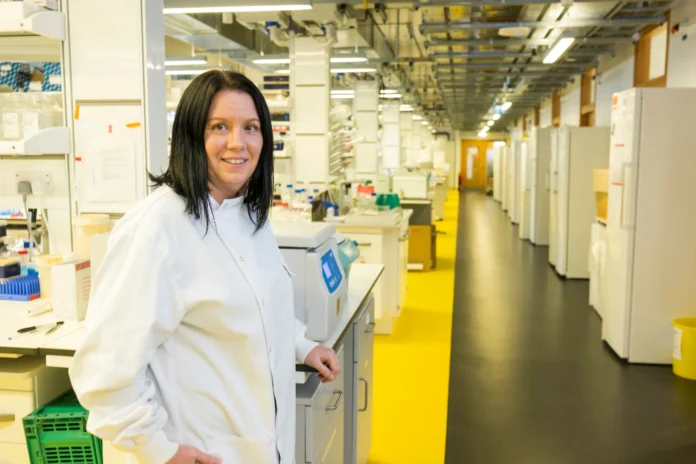Science
Breakthrough Study Reveals New Hope for Bowel Cancer Immunotherapy

Researchers at the University of Galway have made a significant advancement in understanding how bowel cancer undermines the immune system. This groundbreaking study, published in the Journal for ImmunoTherapy of Cancer, outlines how structural stromal cells interact with immune cells to inhibit their function. The findings open new avenues for enhancing immunotherapy treatments for patients battling this prevalent cancer.
Colorectal cancer, commonly known as bowel cancer, is one of the most frequently diagnosed cancers worldwide, ranking as the second leading cause of cancer-related deaths. Alarmingly, diagnoses among individuals under 50 have surged, with cases nearly doubling since 1990. In Ireland alone, bowel cancer affects more than 2,500 people annually.
According to Professor Aideen Ryan, a leading expert in Tumour Immunology at the University of Galway, current immunotherapy options have shown limited success for bowel cancer patients. This leaves many individuals with advanced disease facing a dire prognosis and few treatment alternatives.
The research presents a novel discovery: tumour stromal cells, which provide structural support for cancer growth, are actively reprogramming the immune system. These cells effectively switch off two critical immune components—natural killer (NK) cells and macrophages—rendering them incapable of attacking the cancer. Professor Ryan emphasized that the cancer creates an “immune brake,” blocking the body’s natural defense mechanisms.
The study highlighted a specific enzyme responsible for this suppression, which produces sugars called sialoglycans on stromal cells. These sugars interact with receptors on immune cells, effectively dampening the immune response during immunotherapy. When the researchers inhibited this process using drugs known as sialidases, they observed a reactivation of NK cells and macrophages, leading to tumour shrinkage and prevention of cancer metastasis.
This multidisciplinary research collaboration included colorectal surgeons and pathologists from Galway University Hospital, led by Professor Aisling Hogan and Professor Sean Hynes. Additionally, experts like Dr. Philip Dunne from Queen’s University Belfast and specialists in targeting sialoglycans from Palleon Pharmaceuticals in the USA contributed to the study.
Professor Ryan noted, “Our research represents a breakthrough in understanding bowel cancer and how to improve immunotherapy efficacy.” She highlighted the importance of recognizing that some bowel cancer cells are not merely passive; they actively hinder the immune response.
Furthermore, Michael O’Dwyer, Professor of Medicine and Scientific Director of the University of Galway Cancer Centre, commented on the significant interplay between tumour cells that facilitates disease progression and metastasis. He underlined the innovative nature of this research, which showcases strong ties with industry partners.
The findings from this study have garnered attention, with Jim Broderick, M.D., Chief Executive Officer and Founder of Palleon Pharmaceuticals, noting the previously underappreciated role of the sialoglycan-Siglec axis in immunosuppression within cancer. He expressed optimism for developing new therapies targeting this mechanism, which could benefit patients with colorectal cancer and other malignancies resistant to conventional immunotherapies.
In addition to its scientific implications, Professor Ryan’s research is featured in the Breakthrough Cancer Research exhibition, “Cancer Revolution: Science, Innovation and Hope,” on display at Stephen’s Green Shopping Centre until October 31, 2023. The exhibition includes striking microscopy images and a 3D tumour model that illustrate how stromal cells interact with tumours and inhibit the immune system.
This study not only enhances the understanding of bowel cancer but also provides a hopeful perspective on how immunotherapy could be tailored to improve patient outcomes. The ongoing research into the mechanisms at play may pave the way for more effective treatment strategies, ultimately aiming to enhance survival rates for those affected by this challenging disease.
-

 Top Stories1 month ago
Top Stories1 month agoTributes Surge for 9-Year-Old Leon Briody After Cancer Battle
-

 Entertainment3 months ago
Entertainment3 months agoAimee Osbourne Joins Family for Emotional Tribute to Ozzy
-

 Politics3 months ago
Politics3 months agoDanny Healy-Rae Considers Complaint After Altercation with Garda
-

 Top Stories2 months ago
Top Stories2 months agoIreland Enjoys Summer Heat as Hurricane Erin Approaches Atlantic
-

 World3 months ago
World3 months agoHawaii Commemorates 80 Years Since Hiroshima Bombing with Ceremony
-

 Top Stories3 months ago
Top Stories3 months agoFianna Fáil TDs Urgently Consider Maire Geoghegan-Quinn for Presidency
-

 Top Stories1 month ago
Top Stories1 month agoNewcastle West Woman Patricia Foley Found Safe After Urgent Search
-

 World3 months ago
World3 months agoGaza Aid Distribution Tragedy: 20 Killed Amid Ongoing Violence
-

 World3 months ago
World3 months agoCouple Convicted of Murdering Two-Year-Old Grandson in Wales
-

 Top Stories3 months ago
Top Stories3 months agoClimbing Errigal: A Must-Do Summer Adventure in Donegal
-

 Top Stories3 months ago
Top Stories3 months agoHike Donegal’s Errigal Mountain NOW for Unforgettable Summer Views
-

 World3 months ago
World3 months agoAristocrat Constance Marten and Partner Convicted of Infant Murder









